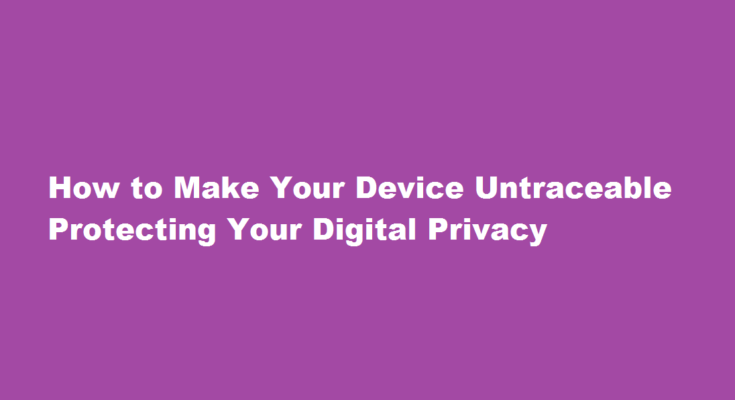Introduction
In an increasingly interconnected world, where our lives are entwined with technology, safeguarding our digital privacy has become paramount. Whether it’s protecting personal information or preventing online tracking, taking steps to make your device untraceable can help ensure your privacy and security. In this article, we will explore effective techniques to enhance your device’s anonymity and reduce the chances of being tracked by various entities. By implementing these measures, you can reclaim control over your online presence and protect your sensitive information from prying eyes.
Encryption and Secure Connections
One of the fundamental ways to make your device untraceable is by using encryption and secure connections. Start by enabling full-disk encryption on your device, ensuring that all data stored on the hard drive is encrypted and protected. Additionally, make use of secure communication protocols like HTTPS when browsing the web to safeguard your online activities from eavesdropping and interception.
Virtual Private Networks (VPNs)
A Virtual Private Network (VPN) is an essential tool for maintaining online privacy. By connecting to a VPN server, your internet traffic is encrypted and routed through a secure tunnel, making it difficult for third parties to monitor your activities. Choose a reputable VPN service provider that does not log your data, offers a wide range of server locations, and employs strong encryption protocols. This way, you can browse the internet anonymously and bypass geo-restrictions while preventing your internet service provider (ISP) from tracking your online behavior.
Tor Network
The Tor network, also known as the Onion Router, is another effective tool for achieving device anonymity. Tor directs your internet traffic through a series of encrypted relays, making it extremely challenging for anyone to trace the origin of your online activities. By using the Tor browser, you can access websites anonymously and circumvent censorship or surveillance measures. However, be cautious when accessing unencrypted websites or downloading files through Tor, as it may compromise your privacy.
Privacy-Focused Browsers and Search Engines
Mainstream browsers and search engines often collect vast amounts of data about their users. Opting for privacy-focused alternatives can help minimize tracking and enhance your online anonymity. Consider using browsers like Mozilla Firefox, Brave, or Tor Browser, which prioritize user privacy and offer features like built-in tracker blockers. Similarly, search engines like DuckDuckGo prioritize privacy by not storing user data or tracking search queries, ensuring that your online searches remain confidential.
Secure Messaging and Email Services
Protecting your communications is crucial for maintaining device anonymity. Choose encrypted messaging apps like Signal or Telegram that offer end-to-end encryption, ensuring that only the intended recipient can access your messages. When it comes to email, opt for providers that prioritize privacy and security, such as ProtonMail or Tutanota. These services employ strong encryption measures and have a strict privacy policy, making it difficult for unauthorized parties to access your emails.
FREQUENTLY ASKED QUESTIONS
What kind of phone can’t be tracked?
The Purism Librem 5 comes with three kill switches, hardware-wise, that can turn off the sensors. These switches are located for the cameras, microphone, Wi-Fi, Bluetooth, and cellular baseband. This phone has all the significant trackers disabled by default.
How do I stop being tracked?
How to block location tracking on Android. Here’s how to block location tracking on an Android phone: Go to Settings > Location, and toggle the location button to Off. That will turn off all location tracking on an Android.
Conclusion
In a digital landscape filled with data breaches and privacy concerns, taking steps to make your device untraceable is essential. By utilizing encryption, VPNs, the Tor network, privacy-focused browsers, and secure messaging services, you can reclaim control over your digital privacy and protect your sensitive information from prying eyes. Stay vigilant, stay informed, and safeguard your digital presence in an increasingly connected world.
Read Also : Mastering The Art of Providing a LinkedIn URL A Comprehensive Guide



